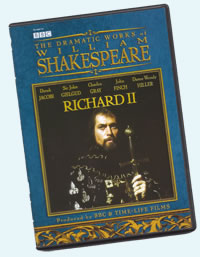Richard II
Well-Versed and Well Beyond
 BBC TV/Time-Life (1978)
BBC TV/Time-Life (1978)
Produced by Cedric Messina. Directed by David Giles. With Derek Jacobi, John Gielgud, Jon Finch.
The BBC production of every single Shakespeare play in the 1970s and ’80s was an ambitiously noble project, but with mixed results. The series has taken its fair share of critical barbs: Shakespeare as soap opera, stagey, stuffy, underwhelming. The series did produce a few gems, though, and among them is this Hope Diamond. Richard II is not only a standout of this series, it’s a standout among all filmed Shakespeare with a centerpiece performance by Derek Jacobi that is as close to definitive as you will ever see.
When it comes to Shakespeare’s most poetical play, it helps to have the two Shakespearean actors most famous for their eloquent deliveries. However, John Gielgud, who was a renowned Richard II in his own much younger days, knew that speaking these lyrical lines recital-like renders a boring play, and both he as John of Gaunt and Jacobi as Richard reach through the verse to the flesh-and-bones characters navigating their precarious situations. Gielgud delivers the “sceptered isle” monologue not as a speech but as the angry, rambling rant of a frustrated old man on death’s doorstep. Coming from Gielgud, it is still symphonic, but it’s more Berlioz than Brahms. The remainder of the scene turns into a heavyweight bout between two actors, four generations apart, slugging it out in blank verse. Split decision goes to Gielgud here, but only because Jacobi stays true to the petulant, arrogant character of Richard at this point.
However, Gielgud’s powerful performance is only a prelude to the ascendant artistry yet to come. The scene of Richard’s return to England should be required viewing in any drama curriculum. Jacobi ranges back and forth across the entire spectrum of passions, from exultant to despair. The shifts come by degrees at times, in sudden fits at other times. Take any great Oscar-winning moment, from George C. Scott’s opening monologue in Patton to Tom Hanks’ elegiac description of Umberto Giordano's opera Andrea Chenier in Philadelphia, from Julia Roberts’ boardroom rant in Erin Brockovich to Colin Firth’s war address in The King’s Speech, combine and treble these and you approach Jacobi’s “Sad stories of the death of kings” monologue in this Richard II. Director David Giles further enhances Jacobi’s performance with perfectly choreographed camera angles and blocking.
Through the arc of Richard’s big speech scenes—the homecoming, Flint Castle, the deposition—Jacobi delivers his long speeches as one mellifluous aria after another, dramatically shifting currents of emotion and comprehension not only line to line but between words. At one point he breaks the single word “fled” free from its line and sends it soaring into its own heights, both in pitch and meaning. Yet, it’s not just poetry. You can look into his eyes and see the man thinking behind the verse and notice via the subtlest shift of expression new thoughts arriving, forming into words and spoken with sometimes careful consideration. It is great Shakespeare verse delivered with utmost lyricism, and yet it seems undeniably spontaneous.
Jacobi’s performance alone is worth the viewing of this broadcast. However, he and Gielgud are just two in a deeply talented cast of actors. Jon Finch is a commanding Bolingbroke, and while he and Richard Owens’ Thomas Mowbray have to give long, formalized speeches of pomp and pageantry at the beginning, both do so with a contagious gusto. Finch’s Bolingbroke noticeably changes upon ascending the throne, becoming reserved in manner as well as in speech; as Richard descends into an embarrassingly public performance of grief, Bolingbroke retreats behind a private wall of silent stillness. David Swift’s Northumberland is given to eye-rolling reactions, but he also shows a touch of menace beneath his political veneer.
Charles Gray plays York as a fully comic character: he seems to have found the basis for his character in the line “Things past redress are now with me past care” as his play-long portrayal is a series of blusters-turned-flusters. His astonishment at Bolingbroke’s blatantly false accusation of Bushy and Green causing a divorce between the king and his wife strikes to the core a man of supposed responsibility powerlessly swept along the tide of ambitious change. Any scene with York is worth watching once for the overall action, then rewinding and watching a second time with your focus solely on Gray’s reaction to whomever is speaking.
The production is full of such details: a shudder over here, a frown back there, a knowing grin from one lord, glances and uneasy shifts in posture among other lords. Richard’s perfunctory crossing himself after Gaunt’s death is repeated in Bolingbroke’s perfunctory crossing himself after Bushy and Green’s beheadings (which are audible off-camera). Despite the serious subject and poetic verse, Giles has discovered much humor throughout this play. He also calls on his actors’ skills with expressions and vocal inflections—namely those of Jacobi and Owens—to touch on Richard’s culpability in the Duke of Gloucester’s murder that precedes the play and provides an undercurrent running through the first three scenes.
The BBC series may be criticized as stagey and stuffy, but with this play it is a choice that proves much worth. The first third of the production resembles a Bayeaux Tapestry come to life, with kings and courtiers richly jeweled and knights in formal armor on horses dressed in royal trappings. All is bathed in light and sunshine with painted skies. After Bolingbroke’s return from exile, however, most scenes take place at night or in dark castles, and the camera moves in tighter on faces.
Giles did make a few questionable choices. He cut entirely the gage-casting scene in Parliament: perhaps he wanted to keep the momentum of Richard’s downfall on a roll by deleting that bizarre business of nobles challenging each other, but the sudden transition from Flint to deposition proves to be too jarring (Shakespeare knew what he was doing when it came to pacing an audience’s expectations). He also cut a key scene of the Queen learning of Bolingbroke’s return. The Queen (Jane Maw) gets short shrift in this production, even in her parting from Richard in the London streets. Rather than an impassioned scene of an in-love couple being parted, Jacobi plays Richard as uncomfortable with and dismissive of his wife (maybe the divorce accusation wasn’t so false?). He shows affection for her only when Northumberland arrives, and the overall effect is to give credence to York’s subsequent description of Richard as a tedious, prattling actor.
Giles also decided to present Richard’s final soliloquy at Pomfret Castle as a passing-of-time montage. The distracting edits coming every four lines or so is the only moment when production stunts performance. The speech, which can come across as obtuse on stage if not on the page, is nevertheless rich in imagery; I would like to have seen and heard it flourish in the uninterrupted tongue, hands, eyes, expression, and thoughts of Jacobi’s King Richard.
Eric Minton
May 11, 2011
Comment: e-mail editorial@shakespeareances.com
Start a discussion in the Bardroom



 Find additional Shakespeareances
Find additional Shakespeareances